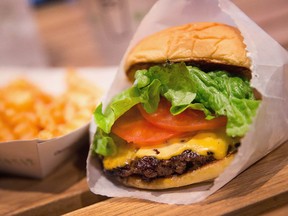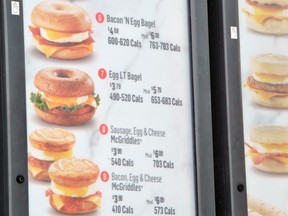New research out of England offers the strongest scientific evidence yet that calorie labelling does not make people eat less
Article content
Reviews and recommendations are unbiased and products are independently selected. Postmedia may earn an affiliate commission from purchases made through links on this page.
In 2017, Ontario became the first and only province to legislate calorie counts on restaurant menus.
The goal was clear: to get people to eat less, especially people who have been eating too much.
Advertisement 2
Article content
The Ontario government said as much a decade ago when it first floated the idea. Former Health Minister Deb Matthews told reporters in 2014: “A raisin bran muffin from Tim Hortons has more calories than a cheeseburger. I think when people start to realize that they’ll make different choices.”
Today, there is an update to that theory. Thumbs down.
Recommended from Editorial
New research out of England, where the same menu policy is just two years old, offers the strongest scientific evidence yet that calorie labelling does not make people eat less. Most people barely notice it, the research found, and only about one person in five factors it into their dinner order, demographically most likely an older and wealthier woman, but a rarity in any case.
“The introduction of mandatory calorie labelling alone was not associated with significant dietary changes in out-of-home food settings,” said lead researcher Megan Polden of the University of Liverpool.
Article content
Advertisement 3
Article content
In England, calorie menu labelling became policy in April 2022. There were several objections, just as there were in Ontario. Some people balked on ideological grounds, that the nanny state has no place in the lunch booths of the nation. Wasting political energy on this was as misguided as the Big Gulp Wars over the size of fountain pop containers a few years previously in New York, which also pioneered mandatory calorie labels on menus. It was just wrong on principle.
Others resisted on more pragmatic grounds of efficiency, that although calorie labelling on menus offers more information about nutrition, it is not useful information. On the contrary, it is mildly overwhelming, requiring middle school arithmetic on the fly and a sort of patience not typically shown by hungry people in line for a sandwich.
Sometimes it even seems insulting, as when the menu informs you, in passive-aggressive parentheses, that the burger special with fries and coleslaw you’re about to order is enough to meet the daily nutritional requirements of a family of four.

What has been missing from the conversation was much science. What studies existed pointed toward a null effect, although there was some indication that they worked in some socially deprived contexts, or more broadly promoted conscious decision-making about food, and therefore were thus justified as targeting the worst of the obesity problem.
Advertisement 4
Article content
One study in 2014, the first of its kind in Canada, showed that posting amounts of calories, fat and salt led to healthier eating and smaller amounts of food. But that was a pilot project in an Ottawa hospital cafeteria, which is a different dining experience than, for example, The Cheesecake Factory, which was flagged in 2018 by an advocacy group for offering one of the worst menu items in America, a Breakfast Burrito with 2,730 calories, 73 grams of saturated fat, and 4,630 mg of sodium. Nutritionally, that’s like eating seven McDonald’s sausage McMuffins in one go.
The Ontario policy came into force at the end of the road for Ontario’s Liberal Party, which was obliterated in the following year’s election, for reasons mostly unrelated to its fast food menu policies. But it was also in the dying years of the age of “nudge” politics, a global phenomenon among policy wonks and civil society types inspired by books such as Nudge: Improving Decisions About Health, Wealth, and Happiness by legal scholar Cass Sunstein and economist Richard Thaler; and Thinking Fast And Slow by Daniel Kahneman.
Advertisement 5
Article content
These aimed to apply the insight that won Kahneman the Nobel Prize in 2002 — that people do not make decisions based on good information and reasonable expectations. On the contrary, human decision-making often seems highly susceptible to simple environmental cues.
Adapted into policy-making, this became a “nudge.” It looked like a shortcut, a behavioural hack. Maybe, the theory went, you didn’t need to do the actual addition of calories in your head. Maybe a triple-digit calorie total staring you in the face was enough to “nudge” you toward a salad and water without you consciously realizing.
Or maybe not.
The new research out of England, published today in the peer-reviewed journal Nature Human Behaviour offers one of the most comprehensive analyses so far on calorie count menu laws.
The verdict is they don’t work for what they are meant to do.
The study surveyed more than 6,500 customers at 330 fast food outlets including pubs, cafes and restaurants, both before and after the labelling policy came into force.
It asked whether they noticed or used the labelling, and what they ordered, including any substitutions which the survey describes as “e.g. salad instead of chips?” It asked whether they ate it all, or shared it, and how much.
Advertisement 6
Article content
The researchers found many cases of non-compliance by restaurants, which co-author Eric Robinson of the University of Liverpool said might partly explain the results.
Awareness of calorie labelling was higher among women, older, and richer people.
But the study found no decrease in calories purchased or consumed, even among those who noticed the labelling, and even among the small minority of 22 per cent who reported actually using the calorie counts to decide on their order.
Our website is the place for the latest breaking news, exclusive scoops, longreads and provocative commentary. Please bookmark nationalpost.com and sign up for our cookbook and recipe newsletter, Cook This, here.
Article content









